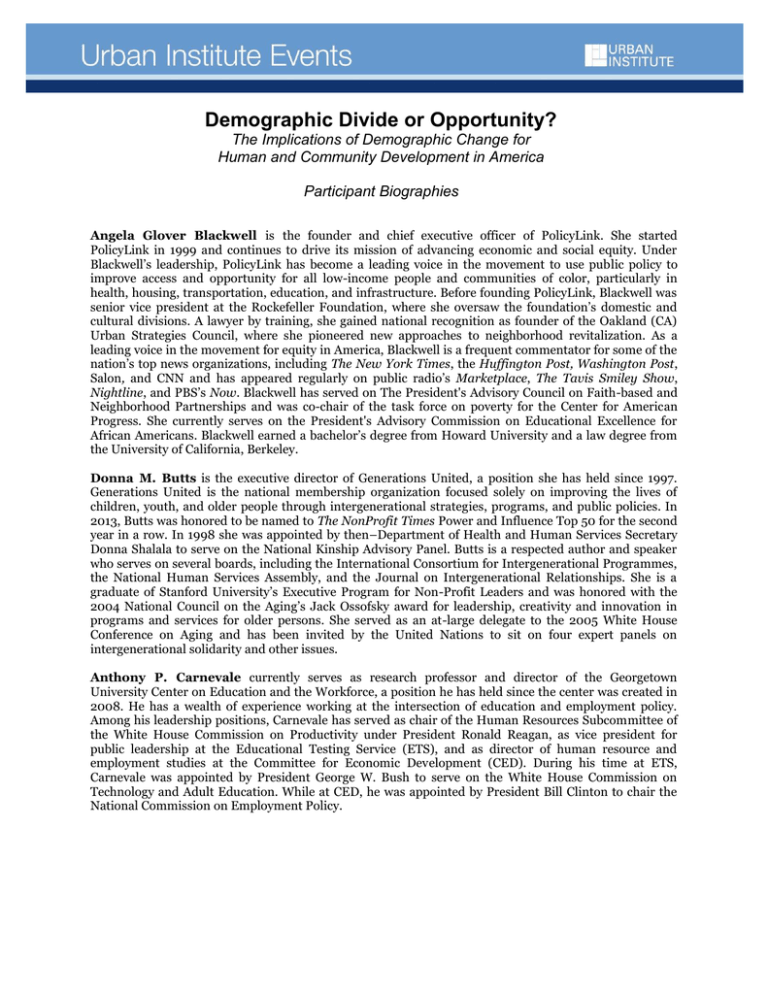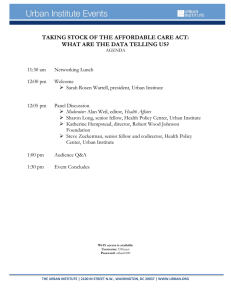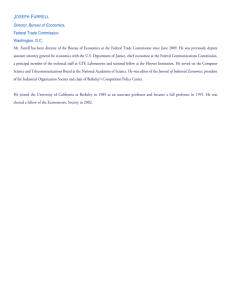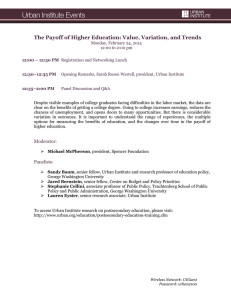Demographic Divide or Opportunity?
advertisement

Demographic Divide or Opportunity? The Implications of Demographic Change for Human and Community Development in America Participant Biographies Angela Glover Blackwell is the founder and chief executive officer of PolicyLink. She started PolicyLink in 1999 and continues to drive its mission of advancing economic and social equity. Under Blackwell’s leadership, PolicyLink has become a leading voice in the movement to use public policy to improve access and opportunity for all low-income people and communities of color, particularly in health, housing, transportation, education, and infrastructure. Before founding PolicyLink, Blackwell was senior vice president at the Rockefeller Foundation, where she oversaw the foundation’s domestic and cultural divisions. A lawyer by training, she gained national recognition as founder of the Oakland (CA) Urban Strategies Council, where she pioneered new approaches to neighborhood revitalization. As a leading voice in the movement for equity in America, Blackwell is a frequent commentator for some of the nation’s top news organizations, including The New York Times, the Huffington Post, Washington Post, Salon, and CNN and has appeared regularly on public radio’s Marketplace, The Tavis Smiley Show, Nightline, and PBS’s Now. Blackwell has served on The President's Advisory Council on Faith-based and Neighborhood Partnerships and was co-chair of the task force on poverty for the Center for American Progress. She currently serves on the President's Advisory Commission on Educational Excellence for African Americans. Blackwell earned a bachelor’s degree from Howard University and a law degree from the University of California, Berkeley. Donna M. Butts is the executive director of Generations United, a position she has held since 1997. Generations United is the national membership organization focused solely on improving the lives of children, youth, and older people through intergenerational strategies, programs, and public policies. In 2013, Butts was honored to be named to The NonProfit Times Power and Influence Top 50 for the second year in a row. In 1998 she was appointed by then–Department of Health and Human Services Secretary Donna Shalala to serve on the National Kinship Advisory Panel. Butts is a respected author and speaker who serves on several boards, including the International Consortium for Intergenerational Programmes, the National Human Services Assembly, and the Journal on Intergenerational Relationships. She is a graduate of Stanford University’s Executive Program for Non-Profit Leaders and was honored with the 2004 National Council on the Aging’s Jack Ossofsky award for leadership, creativity and innovation in programs and services for older persons. She served as an at-large delegate to the 2005 White House Conference on Aging and has been invited by the United Nations to sit on four expert panels on intergenerational solidarity and other issues. Anthony P. Carnevale currently serves as research professor and director of the Georgetown University Center on Education and the Workforce, a position he has held since the center was created in 2008. He has a wealth of experience working at the intersection of education and employment policy. Among his leadership positions, Carnevale has served as chair of the Human Resources Subcommittee of the White House Commission on Productivity under President Ronald Reagan, as vice president for public leadership at the Educational Testing Service (ETS), and as director of human resource and employment studies at the Committee for Economic Development (CED). During his time at ETS, Carnevale was appointed by President George W. Bush to serve on the White House Commission on Technology and Adult Education. While at CED, he was appointed by President Bill Clinton to chair the National Commission on Employment Policy. James Corless is the director of Transportation for America, an alliance of elected, business, and civic leaders from communities across the country, united to ensure that states and the federal government step up to invest in smart, homegrown, locally driven transportation solutions. Before Transportation for America, Corless was a senior planner for the Metropolitan Transportation Commission in the San Francisco Bay Area, where he managed the agency’s efforts to promote smarter growth, transit-oriented development, and mobility options for low-income communities. He was the author of California’s groundbreaking Safe Routes to School law and legislation that paved the way for smart growth blueprints to become part of the regional transportation planning process throughout the state. Hollie Russon Gilman is a civic innovation fellow at the New America Foundation and a fellow at NYU’s Governance Lab. She most recently served in the White House as the Open Government and Innovation Advisor working on a second-term open government agenda, including participatory budgeting as part of US open government commitments. Gilman is a founding researcher and organizer for the Open Society Foundation's Transparency and Accountability Initiative and Harvard's Gettysburg Project to revitalize 21st century civic engagement. She has worked as an advisor, researcher, and consultant to numerous nonprofits and foundations including the World Bank, Case Foundation, and Center for Global Development. She has published in numerous academic and popular audience publications including the International Studies Review and Journal of Public Deliberation. Gilman holds an AB from the University of Chicago and a PhD from the Department of Government at Harvard University. Her dissertation is the first academic study of participatory budgeting in the United States. Anita Hairston is an associate director of PolicyLink, working on transportation policy. She advances organizational priorities that relate to promoting equitable and fair infrastructure investments, with a particular focus on surface transportation. Before joining PolicyLink, Anita spent six years with the Washington, DC Office of Planning, where she served first as a community planner, working on neighborhood and citywide plans, and ultimately as the chief of staff, providing leadership to the agency's media activities, legislative initiatives, and several major projects. She has also worked as a planning consultant on several projects, including a regional smart growth plan for the San Francisco Bay Area. Hairston holds a master’s degree in city and regional planning from the University of California, Berkeley, and is a member of the American Institute of Certified Planners. David Johns is the executive director of the White House Initiative on Educational Excellence for African Americans. This Department of Education initiative will work across federal agencies and with partners and communities nationwide to produce a more effective continuum of education programs for African American students. Before joining the Department, Johns was a senior education policy advisor to the Senate Committee on Health, Education, Labor and Pensions (HELP) under the leadership of Senator Tom Harkin. Before working for the Senate HELP committee, Johns served under the leadership of Senator Ted Kennedy. Johns also was a Congressional Black Caucus Foundation Fellow in the office of Congressman Charles Rangel. Johns has worked on issues affecting low-income and minority students, neglected youth and early childhood education, and with historically black colleges and universities. His research as an Andrew W. Mellon Fellow served as a catalyst to identify, disrupt, and supplant negative perceptions of black males within academia and society. Johns is committed to volunteer services and maintains an active commitment to improve literacy among adolescent minority males. Johns obtained a master’s degree in sociology and education policy at Teachers College, Columbia University, where he graduated summa cum laude while simultaneously teaching elementary school in New York City. He graduated with honors from Columbia University in 2004 with a triple major in English, creative writing, and African American studies. As chief of staff for Corporation for National and Community Service (CNCS), Asim Mishra serves as a senior advisor to the CEO and provides leadership to senior staff and guidance on broad policy issues and key administration and agency relationships. Before CNCS, Mishra was director of the Urban Health Initiative (UHI) at the University of Chicago Medical Center (UCMC), where he directed a key institutional initiative to improve health outcomes through strategic partnerships and led several medical center departments and community partners to implement community-based models of practice. As a part of the UHI, Mishra directed the operations for South Side Healthcare Collaborative, a partnership of 19 community health centers and the UCMC emergency department. While there, he also spearheaded the development of external volunteer programs to connect UCMC staff, faculty, and medical students to the neighboring Southside community. Previously, Mishra was a community education manager at the American Red Cross of Greater Chicago and an AmeriCorps member at Public Allies in Chicago. Hilary Pennington is director of The Generations Initiative, a project funded by national foundations to develop effective responses to the challenges and opportunities of the dramatic demographic shifts occurring in the United States. From 2006 to 2012, she served as director of education, postsecondary success and special initiatives at the Bill & Melinda Gates Foundation. Before joining the foundation, Pennington served as a senior fellow at Center for American Progress and as president and CEO of Jobs for the Future (JFF), a research and policy development organization she cofounded. In her 22 years as president and CEO, Pennington helped JFF become one of the most influential organizations in the country on education, youth transitions, workforce development, and future work requirements. She also served on President Clinton's transition team and as co-chair of President Clinton's Presidential Advisory Committee on Technology. Pennington is a graduate of the Yale School of Management and Yale College. She holds a graduate degree in Social Anthropology from Oxford University and a master’s of theological studies from the Episcopal Divinity School. She was a Fellow at the Harvard Kennedy School of Government in 2000. She serves on the boards of the Noyce Foundation and Capella Education Company. Erika C. Poethig is an Institute fellow and director of urban policy initiatives at the Urban Institute. In this role, she assembles experts from throughout the Institute to tackle policy challenges facing urban America in the 21st century. She leads efforts to better use the Institute's vast resources to inform civic leaders across regional economies who are working on the ground to spur growth, expand opportunities, and improve the lives of people in their communities. She is also developing new clusters of work that examine how specific populations are affected by a range of policies. Most recently, Poethig served as acting assistant secretary for policy development and research at the US Department of Housing and Urban Development, where she led 150 staff responsible for research, policy analysis and program development assistance, and information collection and analysis. She was also a leading architect of the White House Council for Strong Cities and Strong Communities. At the John D. and Catherine T. MacArthur Foundation, Poethig was associate director for affordable housing. She also served as assistant commissioner for policy, resource and program development at the City of Chicago's Department of Housing. In the late 1990s, she developed Mayor Daley's campaign to combat predatory lending, prevent foreclosures, and stabilize communities. Poethig was a Phi Beta Kappa from the College of Wooster, a Fulbright Scholar at the University of Vienna, and graduated with honors with a master’s in public policy from the University of Chicago. Shirley Sagawa is acting chief certification officer for the National Conference on Citizenship, responsible for leading the development of the National Service Technology Platform for the Franklin Project. She is also senior policy advisor to America Forward, a policy coalition of social entrepreneurs; a fellow with the Center for American Progress; and an adjunct professor at the Georgetown Public Policy Institute. She wrote The American Way to Change: How National Service and Volunteers Are Transforming America (Jossey-Bass 2010), and cowrote The Charismatic Organization (Jossey-Bass 2008) and Common Interest, Common Good: Creating Value through Business and Social Sector Partnerships (Harvard Business School Press). Sagawa led the Obama transition for the national service agency and served as a presidential appointee in the H.W. Bush and Clinton administrations. She developed the Social Innovation Fund and was instrumental to the creation of the Corporation for National and Community Service and AmeriCorps. Sagawa began her career as the chief counsel for youth policy for the Senate Labor Committee. She is a graduate of Smith College, the London School of Economics, and Harvard Law School. Matthew Segal is the cofounder and president of OurTime.org, the nation’s largest advocacy organization for young Americans. He leads campaigns to expand job opportunities, voting rights, and civic education among his generation while devising strategic partnerships with media brands to enhance the voice of his peers. Segal is also a regular TV commentator, contributing most frequently to MSNBC, and has appeared on The TODAY Show, Real Time with Bill Maher, CNN’s Piers Morgan Tonight, and the CBS Evening News. He serves on the board of advisors of the Overseas Vote Foundation and Generations United. At age 19, Segal testified before Congress on ballot access for young Americans. Soon after, he founded the Student Association for Voter Empowerment, which quickly expanded to 40 college campuses in more than 15 states. Segal then cofounded the 80 Million Strong Coalition, the largest campaign of organizations in the United States committed to addressing youth unemployment and other economic challenges facing individuals under 30. He was recently named one of 2013’s Ten Outstanding Young Americans by the United States Junior Chamber and received the 2013 National Merit Award from the U.S. Vote Foundation. Segal graduated magna cum laude from Kenyon College in 2008. Betsey Stevenson is a member of the Council of Economic Advisers. She is on leave from the University of Michigan’s Gerald R. Ford School of Public Policy and the economics department, where she is an associate professor of public policy and economics. A labor economist who has published widely in leading economics journals, her research examines the impact of public policies on the labor market, with a focus on women's labor market experiences, the economic forces shaping the modern family, and the potential value of subjective well-being data for public policy. Stevenson served as the chief economist of the US Department of Labor from 2010 to 2011, has taught at the University of Pennsylvania’s Wharton School and Princeton, and has been a visiting scholar at the Philadelphia and San Francisco Federal Reserve Banks. She was also a research associate with the National Bureau of Economic Research and a fellow of the Ifo Institute in Munich, and she has served on the board of directors of the American Law and Economics Association and the advisory board of the Brookings Papers on Economic Activity. Stevenson received a BS from Wellesley College and MA and PhD in economics from Harvard University. Sarah Rosen Wartell is president of the Urban Institute. Wartell, a public policy executive and housing markets expert, previously served in the Clinton administration as the Deputy Assistant to the President for Economic Policy and as Deputy Director for the National Economic Council. She cofounded the Center for American Progress, serving as its first chief operating officer and general counsel. Later, as executive vice president, Wartell oversaw its policy teams and fellows. Before her work at the Center for American Progress, Wartell practiced law in Washington, DC, was a visiting scholar and adjunct professor at Georgetown University Law Center, and was a consultant to the bipartisan Millennial Housing Commission. She directed the Mortgage Finance Working Group and "Doing What Works" government performance programs. Wartell is currently on the boards of the Low Income Investment Fund, Center for Law and Social Policy, and Center for Urban Science and Progress at New York University. She also serves on the Fannie Mae Affordable Housing Advisory Council and is a Penn Institute for Urban Research Scholar. Her areas of expertise include community development, consumer finance and asset building, and housing finance. Justin Wolfers is a senior fellow of the Brookings Institution and is on leave from the University of Michigan, where he is a professor of economics and public policy. He is also an editor of the Brookings Papers on Economic Activity, a visiting professor of economics at the University of Sydney, a research associate with the National Bureau of Economic Research, a research fellow with the Institute for the Study of Labor in Bonn, a research affiliate with the Centre for Economic Policy Research in London, an international research fellow with the Kiel Institute for the World Economy, and a fellow of the CESifo in Munich. Wolfers’ research focuses on labor economics, macroeconomics, political economy, law and economics, social policy, and behavioral economics. He is a contributing columnist for the New York Times, a sometime blogger for Freakonomics, and a commentator for public radio's Marketplace program. Wolfers earned his PhD in economics in 2001 from Harvard University and was a Fulbright, Knox, and Menzies Scholar. He earned his undergraduate degree in economics in his native Australia at the University of Sydney in 1994, winning the University Medal. Joshua Wyner is the executive director of the Aspen Institute College Excellence Program, which aims to strengthen practice and develop leadership that substantially improve college student success. The program's first two initiatives are the Aspen Prize for Community College Excellence, which rewards and shines a spotlight on community colleges that deliver exceptional student results and stimulate replication of successful campus practices, and the New College Leadership Project, which strengthens efforts to recruit and train college presidents who are driven by—and capable of—substantially improving student success. Wyner has spent 16 years as a nonprofit leader, initiating organizations aimed at improving educational outcomes and urban policy. As executive vice president of the Jack Kent Cooke Foundation from 2001 to 2009, he established national scholarship and grantmaking programs for—and conducted original research about—high-achieving low-income students from elementary through graduate school. From 1995 to 2001, Wyner was founding executive director of the DC Appleseed Center, which analyzes and actively seeks to resolve problems affecting the daily lives of those who live and work in the Washington, DC, area. He spent his early career as an organizer and policy analyst with Citizen Action, a program evaluator at the US Government Accountability Office, and an attorney with Beveridge & Diamond. Wyner has a BA in history from Vassar College, a master’s in public administration from the Maxwell School at Syracuse University, and is a cum laude graduate of New York University School of Law.



